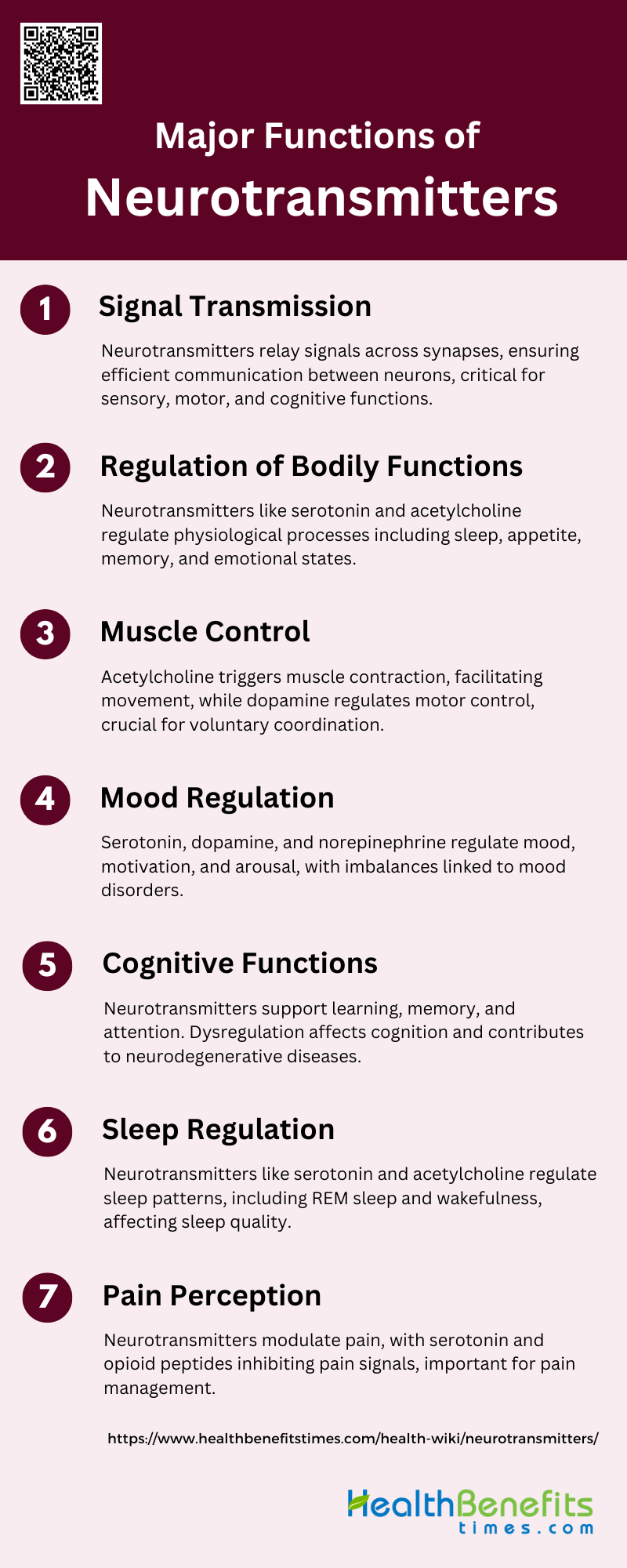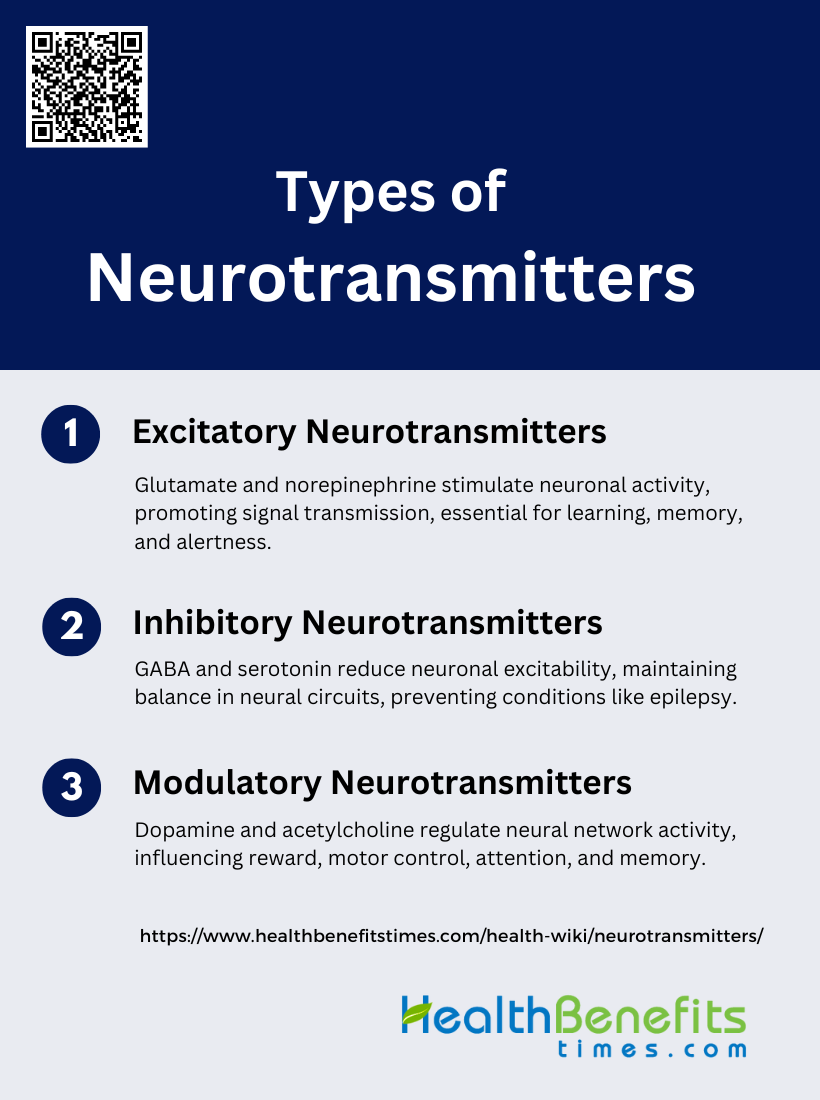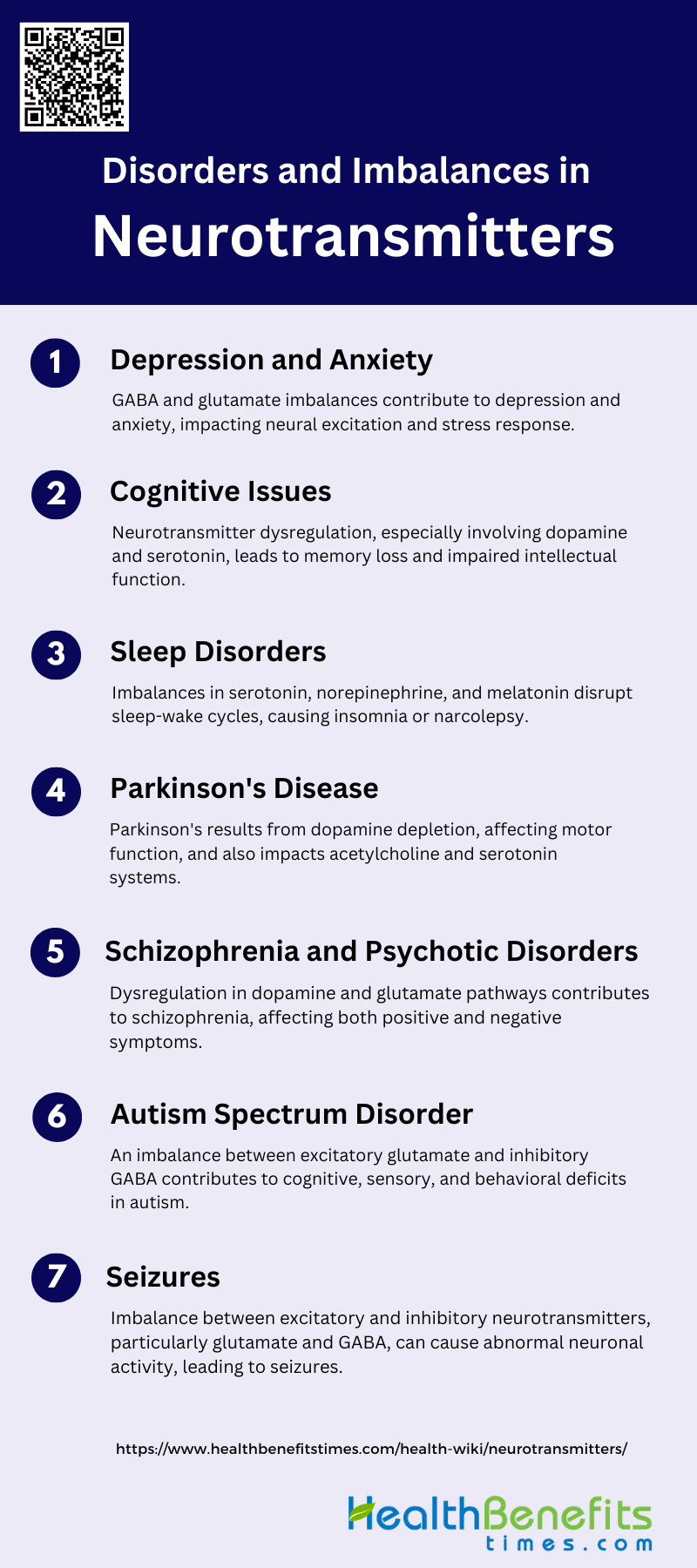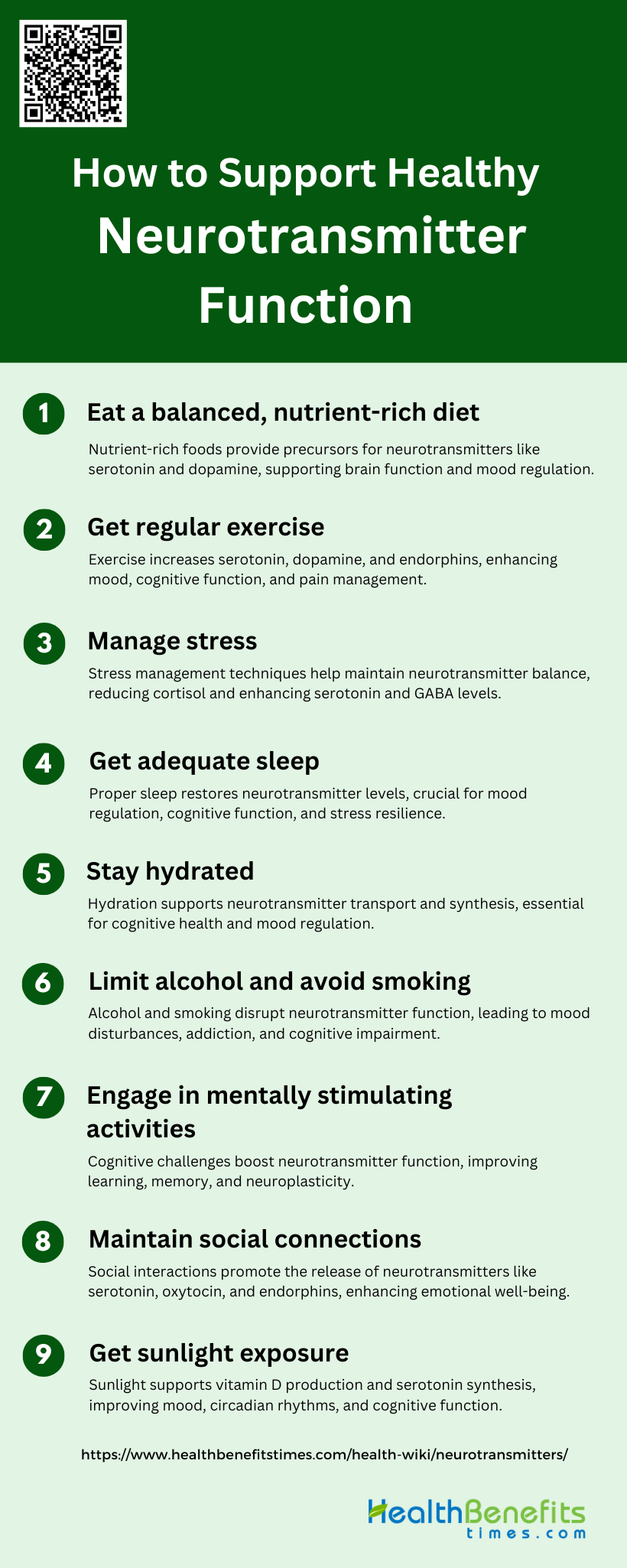Neurotransmitters are chemical substances that play a crucial role in the central nervous system (CNS) by enabling communication between neurons and facilitating most neuronal-glial interactions. These molecules are essential for transmitting signals across synapses, allowing for the proper functioning of the brain and nervous system. Among the various neurotransmitters, glutamate is the most prevalent, used by approximately 80% of all neurons, while gamma-aminobutyric acid (GABA) is utilized by almost all interneurons. Another important neurotransmitter, N-acetylaspartylglutamate (NAAG), plays a role in modulating glutamatergic neurotransmission. Changes in the concentrations of these neurotransmitters, whether due to defects in their synthetic machinery, receptor expression, or errors in their degradation and metabolism, can lead to various neurological disorders. Understanding these changes is crucial for accurate diagnosis, appropriate treatment selection, and monitoring patient response to medications.
How Do Neurotransmitters Work?
Release and Reception
Neurotransmitters are released in response to electrical impulses known as action potentials. When an action potential reaches the presynaptic terminal, it triggers an influx of calcium ions (Ca2+), which in turn prompts synaptic vesicles to fuse with the presynaptic membrane and release their neurotransmitter contents into the synaptic cleft. These neurotransmitters then diffuse across the synaptic cleft and bind to specific receptors on the postsynaptic membrane. The binding of neurotransmitters to these receptors initiates a series of cellular responses that can either excite or inhibit the postsynaptic neuron, depending on the type of neurotransmitter and receptor involved. This precise mechanism ensures that neural signals are accurately transmitted from one neuron to another, facilitating complex processes such as learning, memory, and behavior.
Reuptake and Degradation
To ensure that neurotransmitter signaling is short-lived and specific, the nervous system employs mechanisms for neurotransmitter reuptake and degradation. After neurotransmitters have exerted their effects on the postsynaptic receptors, they are either taken back up into the presynaptic neuron through transporter proteins or broken down by enzymes in the synaptic cleft. Reuptake involves transporter proteins on the presynaptic membrane that capture and recycle neurotransmitters, thus terminating the signal and preparing the neuron for subsequent neurotransmission events. Degradation, on the other hand, involves enzymatic breakdown of neurotransmitters into inactive components, which prevents continuous stimulation of the postsynaptic neuron. These processes are crucial for maintaining synaptic homeostasis and ensuring that neurotransmitter signals remain precise and regulated.
Major Functions of Neurotransmitters
Neurotransmitters are essential chemical messengers that facilitate communication between neurons and other cells in the nervous system. They influence a wide range of physiological and psychological processes, impacting everything from mood and cognition to muscle control and pain perception. Below are the major functions of neurotransmitters:
1. Signal Transmission
Neurotransmitters are essential for the relay of signals between neurons and their target cells. They amplify, transmit, and convert signals within the nervous system, ensuring efficient communication across synapses. The process involves the release of neurotransmitters from the presynaptic neuron into the synaptic cleft, where they bind to specific receptors on the postsynaptic neuron, thereby propagating the signal. This mechanism is fundamental to all neural activities, including sensory perception, motor control, and cognitive functions. The reuptake of neurotransmitters into nerve terminals through high-affinity plasma membrane transporters is a key step that determines the intensity and duration of signaling at synapses.
2. Regulation of Bodily Functions
Neurotransmitters play a crucial role in regulating various bodily functions. For instance, acetylcholine is involved in controlling sleep and wakefulness, movements, memory, and learning. Serotonin regulates sleep, food intake, reproductive behavior, emotional states, temperature, and sensory perception. Dopamine influences reward, behavior, and addiction, while norepinephrine and locus ceruleus are involved in REM sleep. These neurotransmitters ensure the proper functioning of physiological processes and maintain homeostasis within the body. Dysregulation of these neurotransmitters can lead to various diseases and disorders, highlighting their importance in health and disease.
3. Muscle Control
Neurotransmitters are integral to muscle control, with acetylcholine being a primary example. Acetylcholine is released at neuromuscular junctions, where it binds to receptors on muscle cells, triggering muscle contraction. This process is essential for voluntary movements and coordination. Dopamine also plays a role in motor control, with its receptors being involved in the regulation of movement and coordination. Dysregulation of dopamine can lead to motor disorders such as Parkinson’s disease, characterized by tremors and impaired movement. Thus, neurotransmitters are vital for the proper functioning of the muscular system.
4. Mood Regulation
Neurotransmitters such as serotonin, dopamine, and norepinephrine are key regulators of mood and emotional states. Serotonin is involved in the regulation of mood, anxiety, and happiness, with imbalances often linked to depression and anxiety disorders. Dopamine is associated with reward and pleasure, influencing motivation and feelings of euphoria. Norepinephrine affects mood and arousal, playing a role in the body’s stress response. The balance of these neurotransmitters is crucial for mental health, and their dysregulation can lead to mood disorders, highlighting their importance in emotional regulation.
5. Cognitive Functions
Neurotransmitters are essential for cognitive functions such as learning, memory, and attention. Acetylcholine is involved in learning and short-term memory, with its receptors being critical for cognitive processes. Dopamine influences cognitive functions such as working memory, attention, and problem-solving. Serotonin also plays a role in cognitive functions, affecting memory and learning. The proper functioning of these neurotransmitters is crucial for cognitive health, and their dysregulation can lead to cognitive impairments and neurodegenerative diseases such as Alzheimer’s disease.
6. Sleep Regulation
Neurotransmitters such as serotonin, acetylcholine, and norepinephrine are involved in the regulation of sleep. Serotonin influences sleep patterns and is involved in the control of sleep-wake cycles. Acetylcholine plays a role in REM sleep, with its receptors being critical for the initiation and maintenance of this sleep stage. Norepinephrine is also involved in REM sleep and affects arousal and wakefulness. The balance of these neurotransmitters is essential for healthy sleep patterns, and their dysregulation can lead to sleep disorders such as insomnia and sleep apnea.
7. Pain Perception
Neurotransmitters such as substance P, serotonin, and opioid peptides are involved in the perception of pain. Substance P is a neurotransmitter in the slow pain pathway, transmitting pain signals to the brain. Serotonin can modulate pain perception by inhibiting pain signals in the central nervous system. Opioid peptides, such as endorphins, inhibit cerebral neurons involved in the perception of pain, providing analgesic effects. The regulation of these neurotransmitters is crucial for pain management, and their dysregulation can lead to chronic pain conditions, highlighting their importance in pain perception.
Types of Neurotransmitters
Neurotransmitters are chemical messengers that facilitate communication between neurons and other cells, influencing various physiological and psychological processes. They are classified into different types based on their function and effect on the nervous system. Below are the main types of neurotransmitters, each with distinct roles and examples.
1. Excitatory Neurotransmitters
Excitatory neurotransmitters, such as glutamate and norepinephrine, play a crucial role in stimulating neuronal activity and promoting signal transmission across synapses. Glutamate is the primary excitatory neurotransmitter in the central nervous system (CNS) and is essential for synaptic plasticity, learning, and memory. Norepinephrine, another excitatory neurotransmitter, is involved in the “fight or flight” response, increasing arousal and alertness, and modulating blood flow and heart rate. Both neurotransmitters are critical in maintaining the balance of excitation and inhibition in the brain, and their dysregulation can lead to neurological disorders such as epilepsy and cognitive impairments.
2. Inhibitory Neurotransmitters
Inhibitory neurotransmitters, including gamma-aminobutyric acid (GABA) and serotonin, are essential for reducing neuronal excitability and maintaining the balance of neural circuits. GABA is the primary inhibitory neurotransmitter in the central nervous system, playing a significant role in shaping receptive field properties and preventing over-excitation that can lead to conditions like epilepsy. Serotonin, while also acting as an inhibitory neurotransmitter, is involved in regulating mood, sleep, and appetite, and its dysregulation is linked to psychiatric disorders such as depression and anxiety. Both neurotransmitters are crucial for maintaining homeostasis and preventing excessive neuronal firing.
3. Modulatory Neurotransmitters
Modulatory neurotransmitters, such as dopamine and acetylcholine, play a pivotal role in fine-tuning and regulating the overall activity of neural networks. Dopamine is involved in reward, motivation, and motor control, and its dysregulation is associated with disorders like Parkinson’s disease and schizophrenia. Acetylcholine, on the other hand, is critical for attention, learning, and memory, and it modulates signal transmission through cholinergic and nicotinic receptors. Both neurotransmitters can influence various physiological processes and are essential for the proper functioning of the CNS.
Disorders and Imbalances in Neurotransmitters
Neurotransmitter imbalances can lead to a variety of neurological and psychological disorders, affecting mental health and cognitive functions. These imbalances disrupt normal communication between neurons, resulting in symptoms that can significantly impact daily life. Below are some common disorders associated with neurotransmitter imbalances:
1. Depression and Anxiety
Depression and anxiety are often linked to imbalances in neurotransmitter systems, particularly gamma-aminobutyric acid (GABA) and glutamate. Research indicates that patients with Major Depressive Disorder (MDD) exhibit significantly lower levels of GABA compared to healthy controls, suggesting a widespread cortical reduction of this inhibitory neurotransmitter. This imbalance can lead to heightened neural excitation, contributing to the symptoms of depression and anxiety. Additionally, oxidative stress and depleted levels of antioxidants like glutathione (GSH) have been implicated in the pathogenesis of these psychiatric disorders, further complicating the neurotransmitter landscape.
2. Cognitive Issues
Cognitive issues, including memory loss and impaired intellectual function, are often associated with neurotransmitter imbalances. For instance, inherited disorders of neurotransmitter metabolism can lead to various degrees of delayed or impaired psychomotor development, significantly affecting cognitive abilities. Neurotransmitters like dopamine, acetylcholine, and serotonin play crucial roles in cognitive functions, and their dysregulation can result in cognitive deficits. Moreover, disruptions in GABAergic signaling have been linked to cognitive impairments in conditions like autism spectrum disorders (ASD) and schizophrenia, where an imbalance between excitatory and inhibitory neurotransmission is a common feature.
3. Sleep Disorders
Sleep disorders are frequently associated with imbalances in neurotransmitters such as serotonin, norepinephrine, and melatonin. These neurotransmitters regulate sleep-wake cycles and their dysregulation can lead to conditions like insomnia and narcolepsy. For example, serotonin and melatonin act as both hormones and neurotransmitters, influencing sleep patterns by mediating neuronal transmission. Additionally, the role of GABA in promoting sleep is well-documented, and its reduced levels can contribute to sleep disturbances. Understanding these imbalances is crucial for developing effective treatments for sleep disorders.
4. Parkinson’s Disease
Parkinson’s disease is primarily characterized by the degeneration of dopaminergic neurons in the substantia nigra, leading to a significant reduction in dopamine levels. This neurotransmitter imbalance results in the hallmark motor symptoms of Parkinson’s, such as tremors, rigidity, and bradykinesia. Additionally, other neurotransmitters like acetylcholine and serotonin are also affected, contributing to non-motor symptoms such as cognitive decline and mood disorders. Dietary sources containing neurotransmitter precursors have been suggested as potential options to help maintain neurotransmitter balance and mitigate symptoms.
5. Schizophrenia and Psychotic Disorders
Schizophrenia and other psychotic disorders are closely linked to neurotransmitter imbalances, particularly involving dopamine and glutamate. Dysregulation of dopamine pathways is a well-established feature of schizophrenia, contributing to both positive and negative symptoms of the disorder. Additionally, alterations in glutamate and GABA levels have been implicated, with evidence suggesting that oxidative stress and depleted levels of antioxidants like glutathione (GSH) play a role in the pathogenesis of these disorders. Pharmacological interventions often aim to normalize these neurotransmitter imbalances to alleviate symptoms.
6. Autism Spectrum Disorder
Autism spectrum disorder (ASD) is characterized by an imbalance between excitatory and inhibitory neurotransmission, particularly involving glutamate and GABA. This imbalance is thought to contribute to the cognitive, sensory, and behavioral deficits observed in ASD. Studies have shown that disruptions in GABAergic signaling are prevalent in ASD, with fewer GABA receptor subunits observed in post-mortem tissues of autistic individuals. Additionally, the BTBR mouse model of ASD has demonstrated increased susceptibility to seizures due to impaired GABAergic neurotransmission, further supporting the role of neurotransmitter imbalances in ASD.
7. Seizures
Seizures are often the result of an imbalance between excitatory and inhibitory neurotransmitters, particularly glutamate and GABA. This imbalance leads to abnormal neuronal activity, which can manifest as epileptic seizures. Dysfunction of nicotinic acetylcholine receptors and alterations in the dopamine-norepinephrine-epinephrine cycle have also been implicated in the pathogenesis of epilepsy. Understanding the role of these neurotransmitters and their receptors is crucial for developing new diagnostic and therapeutic approaches for epilepsy. Additionally, the BTBR mouse model has shown increased seizure susceptibility due to deficits in GABAergic neurotransmission, highlighting the importance of maintaining a proper excitatory/inhibitory balance.
How to Support Healthy Neurotransmitter Function
Supporting healthy neurotransmitter function is vital for maintaining mental clarity, emotional balance, and overall brain health. Various lifestyle choices can positively influence neurotransmitter production and regulation. Below are effective strategies to enhance neurotransmitter function:
1. Eat a balanced, nutrient-rich diet
A balanced, nutrient-rich diet is essential for maintaining healthy neurotransmitter function. Neurotransmitters are synthesized from simple precursors found in common foods, and their levels can be influenced by dietary habits. For instance, amino acids like tryptophan and tyrosine, found in protein-rich foods, are precursors to serotonin and dopamine, respectively. Consuming a variety of fruits, vegetables, whole grains, and lean proteins ensures that the body has the necessary building blocks to produce neurotransmitters. Additionally, certain foods contain polyphenols, which have been shown to modulate neurotransmitter pathways and offer neuroprotective benefits.
2. Get regular exercise
Regular physical activity is crucial for supporting neurotransmitter function. Exercise has been shown to increase the levels of several neurotransmitters, including serotonin, dopamine, and norepinephrine, which are associated with improved mood and cognitive function. Physical activity also promotes the release of endorphins, which act as natural painkillers and mood elevators. Moreover, exercise can enhance the sensitivity of neurotransmitter receptors, making the brain more responsive to these chemicals. This can help mitigate symptoms of depression and anxiety, and improve overall mental health.
3. Manage stress
Chronic stress can disrupt neurotransmitter balance, leading to various mental health issues such as anxiety and depression. Stress management techniques like mindfulness, meditation, and deep-breathing exercises can help regulate the release of stress hormones and maintain neurotransmitter balance. These practices can reduce the overproduction of cortisol, which negatively impacts neurotransmitter function. Additionally, engaging in stress-reducing activities can enhance the production of neurotransmitters like serotonin and GABA, which promote relaxation and emotional stability.
4. Get adequate sleep
Adequate sleep is vital for the proper functioning of neurotransmitters. During sleep, the brain undergoes processes that restore neurotransmitter levels and receptor sensitivity. Lack of sleep can lead to imbalances in neurotransmitters such as serotonin, dopamine, and norepinephrine, contributing to mood disorders, cognitive impairment, and decreased stress resilience. Ensuring 7-9 hours of quality sleep per night can help maintain optimal neurotransmitter function, supporting mental and emotional well-being.
5. Stay hydrated
Hydration plays a significant role in maintaining neurotransmitter function. Water is essential for the transport of nutrients and the removal of waste products in the brain. Dehydration can impair the synthesis and release of neurotransmitters, leading to cognitive decline and mood disturbances. Drinking adequate amounts of water throughout the day ensures that the brain’s biochemical environment remains stable, supporting the efficient functioning of neurotransmitter systems.
6. Limit alcohol and avoid smoking
Alcohol and smoking can have detrimental effects on neurotransmitter function. Alcohol consumption can disrupt the balance of neurotransmitters like GABA and glutamate, leading to mood swings, anxiety, and cognitive impairment. Smoking, on the other hand, affects neurotransmitter systems by altering dopamine levels, which can lead to addiction and mental health issues. Limiting alcohol intake and avoiding smoking can help maintain the natural balance of neurotransmitters, promoting better mental health and cognitive function.
7. Engage in mentally stimulating activities
Mentally stimulating activities such as puzzles, reading, and learning new skills can enhance neurotransmitter function. These activities promote the release of neurotransmitters like dopamine and acetylcholine, which are crucial for learning, memory, and motivation. Engaging in cognitive challenges can also increase neuroplasticity, the brain’s ability to reorganize itself by forming new neural connections. This can improve cognitive resilience and delay the onset of neurodegenerative diseases.
8. Maintain social connections
Social interactions are important for maintaining healthy neurotransmitter levels. Positive social connections can stimulate the release of oxytocin, serotonin, and endorphins, which contribute to feelings of happiness and well-being. Social engagement also helps reduce stress and anxiety, which can otherwise disrupt neurotransmitter balance. Maintaining strong social ties can therefore support emotional health and cognitive function, providing a buffer against mental health disorders.
9. Get sunlight exposure
Sunlight exposure is essential for the synthesis of vitamin D, which plays a role in the production of neurotransmitters like serotonin. Sunlight also helps regulate the body’s circadian rhythms, which are crucial for sleep and overall mental health. Regular exposure to natural light can improve mood, reduce symptoms of depression, and enhance cognitive function by supporting the balance of neurotransmitters. Aim for at least 15-30 minutes of sunlight exposure daily to reap these benefits.
FAQs
1. How do neurotransmitters influence mental health treatment?
Neurotransmitters play a crucial role in mental health, and their imbalances can lead to disorders such as depression, anxiety, and schizophrenia. Medications like antidepressants or antipsychotics often target neurotransmitter systems to restore balance, making them essential in treating these conditions.
2. Can diet affect neurotransmitter production?
Yes, certain nutrients in foods serve as precursors for neurotransmitters. For example, amino acids like tryptophan and tyrosine are used to synthesize serotonin and dopamine. A healthy diet can support optimal neurotransmitter function.
3. How are neurotransmitters measured in the body?
Neurotransmitters are typically measured through cerebrospinal fluid analysis, blood tests, or imaging techniques like PET scans that track their activity in the brain.
4. Are neurotransmitter imbalances hereditary?
Genetic factors can influence neurotransmitter production, metabolism, and receptor sensitivity, which can predispose individuals to neurotransmitter-related disorders like depression, anxiety, and schizophrenia.
5. How do neurotransmitters affect the aging process?
As we age, changes in neurotransmitter production and receptor sensitivity can impact cognitive functions, mood, and memory. Declines in neurotransmitters such as acetylcholine and dopamine are associated with neurodegenerative diseases like Alzheimer’s and Parkinson’s.
6. What is the difference between neurotransmitters and hormones?
Neurotransmitters are chemicals used for communication between neurons in the nervous system, while hormones are released into the bloodstream to regulate distant organs. Some chemicals, like serotonin and dopamine, can act as both.
7. Can neurotransmitter levels be increased naturally?
Yes, lifestyle changes such as regular exercise, proper sleep, stress management, and exposure to sunlight can naturally boost levels of certain neurotransmitters like serotonin and dopamine.
8. What is the role of neurotransmitters in addiction?
Addiction is strongly influenced by neurotransmitters, particularly dopamine, which regulates reward and pleasure pathways. Drugs and addictive behaviors can hijack these systems, leading to dependency.
9. Can environmental factors affect neurotransmitter function?
Yes, environmental stressors, toxins, and poor diet can negatively impact neurotransmitter balance, potentially leading to mental health issues or cognitive impairments.
10. Do neurotransmitter supplements work?
There are supplements that claim to support neurotransmitter production, such as 5-HTP for serotonin or L-tyrosine for dopamine. However, the effectiveness and safety of these supplements can vary, and it’s important to consult a healthcare provider before use.






